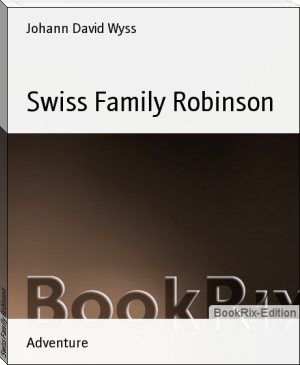Swiss Family Robinson - Johann David Wyss (poetry books to read txt) 📗

- Author: Johann David Wyss
- Performer: -
Book online «Swiss Family Robinson - Johann David Wyss (poetry books to read txt) 📗». Author Johann David Wyss
sausages, a bag of maize and wheat, and a quantity of other seeds and
vegetables. I then added a barrel of sulphur for matches, and as much
string, cordage, and sailcloth as I could find.
Fritz reminded me that sleeping on the ground, even with the leaves and
moss the boys had collected, had been both cold and hard, and prevailed
upon me to increase our cargo by some hammocks and blankets.
All this—with nails, tools and agricultural implements—completed our
cargo, and sank our boat so low, that I should have been obliged to
lighten her had not the sea been calm.
Night drew on and a large fire, lighted by those on shore, showed us
that all was well. We replied by hoisting four ship’s lanterns, and two
shots announced us that our signal was perceived.
The ship seemed to be in so wretched a condition that the least
tempest, such as might arise unexpectedly during the night, must
complete her destructions. We resigned ourselves to sleeping in our
small boat, which appeared safer than the great vessel. So, with a
heartfelt prayer for the safety of our dear ones on shore, we retired,
and Fritz at all events was soon sound asleep.
For a while I could not sleep, the thought of my wife and
children—alone and unprotected, save by the great dogs—disturbed my
rest. The night at length passed away. At daybreak Fritz and I arose,
and went on deck. I brought the telescope to bear upon the shore, and
with pleasure saw the flag still waving in the morning breeze; while I
kept the glass directed to the land, I saw the door of the tent open,
and my wife appear and look steadfastly towards us.
I at once hoisted a white flag, and in reply, the flag on shore was
thrice dipped. Oh, what a weight seemed lifted from my heart as I saw
the signal!
`Fritz,’ I said, `now that I have had a sight of your mother, my next
concern is for the animals on board. Let us endeavour to save the lives
of some of them, at least, and to take them with us.’
`Would it be possible to make a raft,’ suggested Fritz, `and get them
all on it and in that way take them to shore?’
`But how could we induce a cow, an ass, and a sow either to get upon a
raft or, when there to remain motionless and quiet? The sheep and goats
one might perhaps find means to remove, they being of a more docile
temper; but for the larger animals, I am at a loss as to how to
proceed.’
`We could tie a long rope around the sow’s neck,’ Fritz now proposed,
`and throw her without ceremony into the sea. Her immense bulk will be
sure to sustain her above water, and by the rope, we can draw her after
the boat.’
`An excellent idea,’ I replied, `but unfortunately it is of no use but
for the pig;* and she is the one I care least about preserving.’ In
fact, I had an idea how to proceed, but I desired to allow Fritz to
invent a solution.
* In fact all of the animals would have been able to float,
though swimming against the strong current would have been
difficult. The solution chosen does not address this problem
at all.
`Well,’ said Fritz, `I can think of nothing else, unless indeed we make
them such swimming-belts as you made for the children.’
`Really, my boy, that idea is worth having. I am not joking, indeed,’ I
continued, as I saw him smile, `we may get every one of the animals
ashore in that way.’
So saying, I caught a fine sheep, and proceeded to put our plan into
execution. I first fastened a broad piece of linen round its belly, and
to this attached some corks and empty tins; then with Fritz’s help, I
flung the animal into the sea—it sank, but a moment afterwards rose
and floated famously.
`Hurrah!’ exclaimed Fritz, `we will treat them all like that.’ We then
rapidly caught the other animals and provided them one after the other
with a similar contrivance. The cow and ass gave us more trouble than
did the others. For them we required something more buoyant than the
mere cork; we at last found some empty casks and fastened two to each
animal by thongs passed under its belly.
This done, the whole herd were ready to start, and we brought the ass
to one of the ports to be the first to be launched. After some
maneuvering we got him in a convenient position, and then a sudden
heave sent him plunging into the sea. He sank, and then, buoyed up by
the casks, emerged head and back from the water.
The cow, sheep and goats followed him one after the other, and then the
sow alone remained. She seemed, however determined not to leave the
ship; she kicked, struggled and squealed so violently, that I really
thought we should be obliged to abandon her. Indeed, we found it
necessary to put a muzzle on her to prevent her from biting before we
could tie a large piece of cork under her body. At length, after much
trouble, we succeeded in sending her out of the port after the others,
and when once in the water, such was the old lady’s energy that she
quickly distanced them, and was the first to reach the shore.
We had fastened to the horns or neck of each animal a cord with a
float attached to the end, and now embarking, we gathered up these
floats, set sail, and steered for shore, drawing our herd after us. I
saw, now, how impossible it would have been for us to have succeeded in
our enterprise without the aid of a sail; the weight of the good sank
the boat so low in the water that none of our exertions would have
allowed us to row such a distance. But with the sail, we proceeded so
completely to our satisfaction that were able to get some biscuits and
enjoyed a midday meal; then, while Fritz amused himself with his
monkey, I took up my glass and tried to make out how our dear ones on
shore were employing themselves.
As I was thus engaged, a sudden shout from Fritz surprised me. I
glanced up; there stood Fritz with his gun to his shoulder, pointing it
at a huge shark. The monster was making for one of the finest sheep; he
turned on his side to seize his prey; as the white of his belly
appeared Fritz fired. The shot took effect, and our enemy disappeared,
leaving a trace of blood on the calm water.
`Well done, my boy,’ I cried, `you will become a crack shot one of
these days; but I trust you will not often have such dangerous game to
shoot.’ Fritz’s eyes sparkled at his success and my praise, and
reloading his gun, carefully watched the water. But the shark did not
again appear, and borne onwards by the breeze, we quickly neared the
shore. Steering the boat to a convenient landing place, I cast off the
ropes which secured the animals, and let them get ashore as best they
might.
There was no sign of my wife or children when we stepped on land, but a
few moments afterwards they appeared, and with a shout of joy ran
towards us.
We were thankful to be once more united, and after asking and replying
to a few preliminary questions, proceeded to release our herd from
their swimming belts, which, though so useful in the water, were
exceedingly inconvenient on shore. My wife was astonished at the
apparatus. `How clever you are,’ said she.
`I am not the inventor,’ I replied, `the honour is due to Fritz. He not
only thought of this plan for bringing off the animals, but saved one
at least of them from a most fearful death.’ And I then told them how
bravely he had encountered the shark. My wife was delighted with her
son’s success, but declared that she would dread our trips to the
vessel more than ever, knowing that such savage fish inhabited the
waters.
Fritz, Ernest and I began the work of unloading our craft, while Jack,
seeing that the poor donkey was still encumbered with his
swimming-belt, tried to free him from it. But the donkey would not
stand quiet, and the child’s fingers were not strong enough to loosen
the cordage; finally, therefore, he scrambled upon the animal’s back,
and urging him on with hand and foot, trotted towards us.
`Come, my boy,’ I said, `no one must be idle here, even for a moment;
you will have riding practise enough hereafter; dismount and come and
help us.’
Jack was soon on his feet. `But I have not been idle all day,’ he
said, `look here!’ and he pointed to a belt round his waist. It was a
broad belt of yellow skin in which he had stuck a couple of pistols and
a knife. `And see,’ he added, `what I have made for the dogs. Here,
Juno, Turk,’ the dogs came bounding up at his call, and I saw that they
were each supplied with a collar of the same skin, in which were
fastened nails, which bristled round their necks in a most formidable
manner.
`Capital, capital! my boy,’ said I, `but where did you get your
materials, and who helped you?’
`Except in sewing,’ said my wife, `he had little assistance, and as for
the materials, Fritz’s jackal supplied us with the skin, and the
needles and thread came out of my wonderful bag. You little think how
many useful things may be had from that same bag; it is woman’s duty
and nature, you know, to see after trifles.’
Fritz evidently did not approve of the use to which his jackal’s hide
had been devoted, and holding his nose, begged his little brother to
keep at a distance. `Really, Jack,’ he said, `you should have cured the
hide before you used it, the smell is disgusting, don’t come near me.’
`It’s not the hide that smells at all,’ retorted Jack, `it is your
nasty jackal itself that you left in the sun.’
`Now, boys,’ said I, `no quarrelling here; do you, Jack, help your
brother to drag the carcase to the sea, and if your belt smells after
that you must take it off and dry it better.’
The jackal was dragged off, and we then finished our work of unloading
our boat. When this was accomplished we started for our tent, and
finding there no preparation for supper, I said, `Fritz, let us have a
Westphalian ham.’
`Ernest,’ said my wife, smiling, `let us see if we cannot conjure up
some eggs.’
Fritz got out a splendid ham and carried it to his mother
triumphantly, while Ernest set before me a dozen white balls with
parchment-like coverings.
`Turtles’ eggs!’ said I. `Well done, Ernest, where did you get them?’
`That,’ replied my wife, `shall be told in due course when we relate
our adventures; now we will see what they will do towards making a
supper for you; with these and your ham I do not think we shall
starve.’
Leaving my wife to prepare supper, we returned to the shore and
brought up what of the cargo we had left there; then, having collected
our herd of animals (except for the sow, which ran away, and the ducks
and geese which deserted us for a nearby marshy swamp), we returned to
the tent.
The





Comments (0)